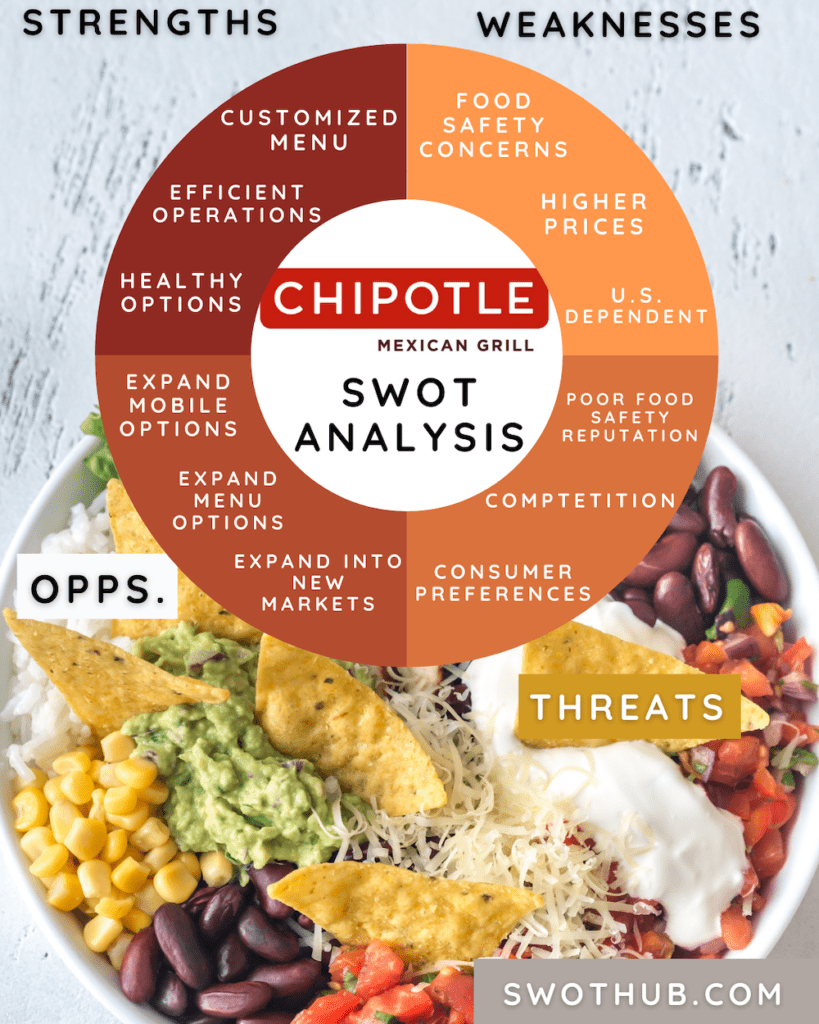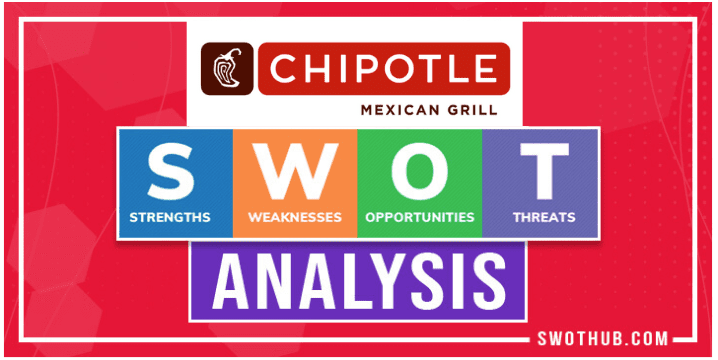The fast-food restaurant industry is no stranger to competition but adding a fresh and “healthier” fast-food experience has become big business. A Chipotle SWOT analysis will highlight how Chipotle’s competitors have tried to outpace them in menu offerings, mobile ordering options, and especially food safety. Dubbed “fast-casual”, see how Chipotle turned an accidental success story into a delicious Mexican grill restaurant that continues to have its weaknesses and opportunities in this Chipotle SWOT analysis.
Table of Contents
Chipotle History
Chipotle Mexican Grill is a fast-casual restaurant chain that specializes in Mexican cuisine. The company was founded in 1993 by Steve Ells, who opened the first Chipotle restaurant in Denver, Colorado. Initially, Chipotle was a small, locally-focused business that served only a limited menu of burritos, tacos, and salads.
However, the restaurant’s focus on fresh, high-quality ingredients and customizable menu options proved to be extremely popular. Within a few years, Chipotle expanded to several locations in the Denver area and was beginning to attract attention from investors.
In 1998, McDonald’s Corporation became a minority investor in Chipotle, providing the company with significant resources to expand rapidly. Under McDonald’s ownership, Chipotle continued to grow rapidly, expanding to hundreds of locations across the United States and opening its first international location in Canada in 2008.
In 2006, McDonald’s divested its ownership stake in Chipotle, making it an independent company once again. Since then, Chipotle has continued to expand, opening new locations around the world and introducing new menu items and promotions.
Chipotle has faced challenges in recent years, including food safety issues that led to several outbreaks of E. coli and other illnesses among customers. The company has since taken steps to improve its food safety practices, but these incidents have harmed its reputation and financial performance.
Chipotle SWOT Analysis At-A-Glance
| Company | Chipotle Mexican Grill |
| Industry | Restaurants |
| Founders | Steve Ells |
| Year founded | 1993 |
| CEO | Brian Niccol |
| Headquarters | Newport Beach, California |
| Number of employees | 104,958 (December 2022) |
| Revenue (FY 2022) | US $8.6 Billion (2022) |
Chipotle SWOT Analysis:
A SWOT analysis is a framework used to assess a company’s competitive situation and to create strategic planning. By taking Chipotle’s strengths, and weaknesses of Chipotle threats of Chipotle’s as well as opportunities of Chipotle into account, we may better gain in-depth knowledge about Chipotle’s company. In this article, we’ll be taking a look at Chipotle’s SWOT framework to better understand its competitive position and potential for future growth. See how Chipotle’s competitors fare against them and learn about Chipotle’s strengths, weaknesses, opportunities, and Chipotle’s threats.
Chipotle SWOT Analysis Strengths:
A Chipotle SWOT Analysis has several strengths that give it an advantage over its competitors. These strengths include:
Strong brand reputation: Chipotle has a reputation for using high-quality, fresh ingredients and for promoting sustainable food practices. This reputation has helped it build a loyal customer base that appreciates its commitment to quality and ethical sourcing.
Customizable menu: Chipotle’s menu is highly customizable, allowing customers to create their meals by choosing from a range of ingredients. This flexibility appeals to customers who want to tailor their meals to their specific tastes and dietary needs.
Efficient operations: Chipotle has streamlined its operations to ensure that orders are processed quickly and efficiently. This allows it to serve large numbers of customers during peak periods, which can give it an advantage over competitors that struggle to keep up with demand.
Strong digital presence: Chipotle has made significant investments in digital platforms like mobile apps, online ordering, and delivery services. This has enabled it to expand its customer base and offer a simple, convenient ordering process.
Emphasis on sustainability: Chipotle has a strong commitment to sustainability, both in terms of its ingredients and its business practices. This resonates with customers who are increasingly concerned about the environmental impact of their food choices.
What are the Weaknesses of Chipotle in the SWOT Analysis?
In a Chipotle SWOT analysis, some of the weaknesses of Chipotle compared to its competitors are:
Dependence on the US market: Since a sizable portion of Chipotle’s revenue comes from domestic operations, it is susceptible to US consumer spending trends as well as other economic and political factors. Competitors with a larger global footprint might be more prepared to handle market fluctuations.
Limited menu compared to competitors: While Chipotle’s customizable menu is a strength, it can also be a weakness in that it may not offer enough variety for some customers. Competitors with more extensive menus may be able to appeal to a broader range of tastes and preferences.
Food safety concerns: In the past, Chipotle has faced food safety issues that have damaged its reputation and hurt its sales. While the company has taken steps to improve its food safety practices, these incidents may have a lasting impact on consumers’ perception of the brand.
Higher prices than competitors: Chipotle’s emphasis on high-quality, sustainably sourced ingredients can make its menu items more expensive than those of some competitors. This may make it less appealing to price-conscious customers, particularly in a highly competitive market.
Limited marketing: Chipotle has historically relied more on word-of-mouth and social media marketing to promote its brand because it has a relatively low marketing budget in comparison to some of its rivals. As a result, it might be more difficult for the business to win over new clients and outsell rivals who invest more heavily in advertising.

Chipotle SWOT Analysis Opportunities:
In a Chipotle SWOT analysis, some of the opportunities that Chipotle has over its competitors are:
Expanding into new markets: Chipotle has a significant opportunity to expand into new geographic markets, both domestically and internationally. This could help the company diversify its revenue streams and reduce its dependence on the US market.
Expand online and mobile ordering options: The shift towards online and mobile ordering has opened up new opportunities for Chipotle to reach customers who prefer the convenience of ordering from their mobile devices or computers. By continuing to invest in its digital platforms, Chipotle can gain a competitive edge in the market.
Provide more plant-based menu items: As more consumers look to reduce their meat consumption, there is a growing demand for plant-based menu items. Chipotle has an opportunity to capitalize on this trend by introducing more vegetarian and vegan options on its menu.
Catering and delivery: Catering and delivery services represent a significant growth opportunity for Chipotle, as more customers seek out convenient and flexible dining options. By expanding its catering and delivery services, Chipotle can tap into new revenue streams and reach new customers.
Innovation in menu and marketing: Chipotle has an opportunity to differentiate itself from competitors by introducing innovative menu items and marketing campaigns that appeal to a broader range of customers. By staying ahead of trends and consumer preferences, Chipotle can maintain its position as a leader in the fast-casual restaurant market.
Chipotle SWOT Analysis Threats:
Some of the threats that a Chipotle SWOT analysis highlights and needs to be aware of from its competitors are:
Changing consumer preferences: Consumer preferences can be fickle and are subject to rapid change. Chipotle needs to be aware of the threat of changing consumer preferences and be agile enough to adapt its menu and marketing strategies accordingly.
Food safety incidents: Chipotle has faced several food safety incidents in the past, which have damaged its reputation and hurt its sales. The threat of future food safety incidents remains a concern for the company, which needs to remain vigilant in its food safety practices.
Regulatory environment: The restaurant industry is subject to a range of regulations at the local, state, and federal levels. Changes in regulations can significantly impact Chipotle’s operations and profitability. The company needs to be aware of the threat of changes in regulations and have contingency plans in place to adapt to any regulatory changes.
Intense competition: The fast-casual restaurant market is highly competitive, with many established players and new entrants vying for market share. Chipotle needs to be aware of the threat of increased competition, which can put pressure on its sales and margins. Take a look at Chipotle competitors below:
Chipotle Competitors:
Chipotle’s main competitors in the fast-casual restaurant industry include:
- Qdoba Mexican Eats
- Moe’s Southwest Grill
- Taco Bell
- Del Taco
- El Pollo Loco
- Baja Fresh
These Chipotle competitors have strengths that differentiate them from Chipotle, including:
Qdoba Mexican Eats: Like Chipotle, Qdoba offers customizable menu options, but with a broader range of ingredients that includes queso, grilled vegetables, and more. Qdoba also offers more menu items, such as tortilla soup and breakfast burritos, than Chipotle.
Moe’s Southwest Grill: Moe’s differentiates itself from Chipotle, focusing on a fun and energetic atmosphere, including a welcoming greeting for every customer (“Welcome to Moe’s!”) and a colorful, playful interior design. Moe’s also offers free chips and salsa with every order, which is a popular feature among customers.
Taco Bell: While not strictly a fast-casual restaurant, Taco Bell competes with Chipotle by offering Mexican-inspired food at lower prices. Taco Bell has a broad menu that includes items such as tacos, burritos, nachos, and quesadillas, as well as unique offerings like the Crunchwrap Supreme and the Doritos Locos Taco.
Other Mexican-themed chains: Many other fast-casual Mexican restaurant chains compete with Chipotle, including Del Taco, El Pollo Loco, and Baja Fresh. Each of these chains offers unique strengths, such as Del Taco’s emphasis on fresh ingredients and El Pollo Loco’s focus on grilled chicken.
Chipotle SWOT Analysis – Conclusion and Recommendations:
In conclusion, while Chipotle has established itself as a popular and successful brand, it faces intense competition from other players in the fast-casual restaurant market.
To maintain its growth and competitive advantage, Chipotle must continue to:
- Leverage its strengths and opportunities, such as expanding into new markets, investing in digital platforms, and innovating its menu and marketing strategies.
- Competitors differentiate themselves from Chipotle by offering different menu options, pricing, atmosphere, and branding, which appeal to different segments of the market. In this Chipotle SWOT analysis, we can see they need to follow suit with new menu ideas, etc…
- Chipotle must remain aware of the threats it faces from its competitors, changing consumer preferences, economic downturns, food safety incidents, and regulatory changes, and be prepared to adapt to these challenges to position itself for long-term success.





